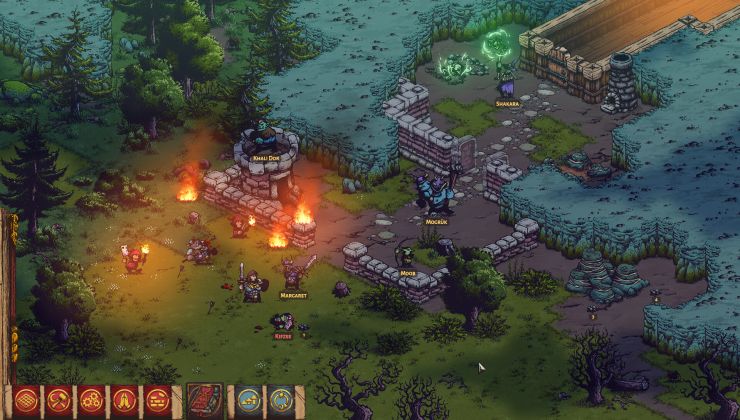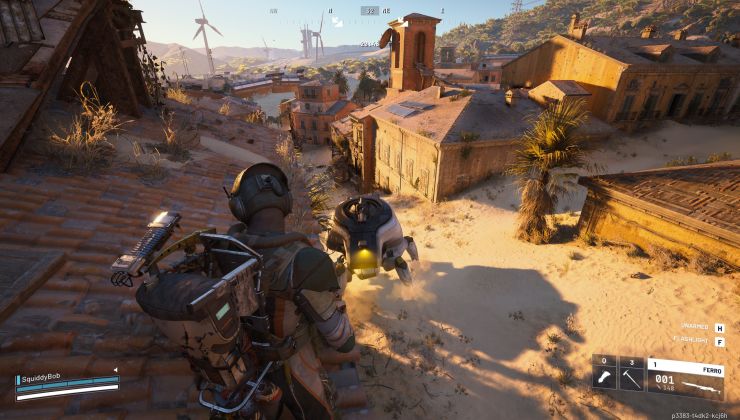Recently I covered an interesting movement called Stop Killing Games, which has an aim to bring to light the issue of publishers dropping support for and turning off games that people paid for.
This came about after Ubisoft decided to shut down The Crew, so everyone who had purchased it got left with a game that no longer works due to their forced online requirement. This certainly isn't the first game to do it, there's been a good few games left broken over the years and with how big the gaming industry is now, there will be more games shut by bigger publishers.

Pictured - The Crew
A petition was set up on the UK government's official petition website. On here when a petition hits 10,000 votes the government has to reply. If they hit 100,000 though, it's supposed to then be considered for an actual debate in Parliament. The petition closes on 16th October 2024.
That petition has hit 17,426 signatures at time of writing, and the UK government replied on May 2nd. The short version is: "Those selling games must comply with UK consumer law. They must provide clear information and allow continued access to games if sold on the understanding that they will remain playable indefinitely.".
No game is marketed anywhere on being available indefinitely, and in the case of Steam, you're only buying a license and not ownership of the game, so this isn't likely to go much further until it can be pushed much harder.
The full reply is much wordier and goes on to mention how "There may be occasions where companies make commercial decisions based on the high running costs of maintaining older servers for video games that have declining user bases.".
Which is a valid point, maintaining game servers does cost time and money, but that's not quite the point of the campaign argument. The point is these games with single-player modes that have forced server connections are made so that there's no way for players to continue them on, you're just left with nothing when the publisher decides to move on.
The full UK government reply is below:
The Government recognises recent concerns raised by video games users regarding the long-term operability of purchased products.
Consumers should be aware that there is no requirement in UK law compelling software companies and providers to support older versions of their operating systems, software or connected products. There may be occasions where companies make commercial decisions based on the high running costs of maintaining older servers for video games that have declining user bases. However, video games sellers must comply with existing consumer law, including the Consumer Rights Act 2015 (CRA) and the Consumer Protection from Unfair Trading Regulations 2008 (CPRs).
The CPRs require information to consumers to be clear and correct, and prohibit commercial practices which through false information or misleading omissions cause the average consumer to make a different choice, for example, to purchase goods or services they would not otherwise have purchased. The regulations prohibit commercial practices which omit or hide information which the average consumer needs to make an informed choice, and prohibits traders from providing material information in an unclear, unintelligible, ambiguous or untimely manner. If consumers are led to believe that a game will remain playable indefinitely for certain systems, despite the end of physical support, the CPRs may require that the game remains technically feasible (for example, available offline) to play under those circumstances.
The CPRs are enforced by Trading Standards and the Competition and Markets Authority. If consumers believe that there has been a breach of these regulations, they should report the matter in the first instance to the Citizens Advice consumer helpline on 0808 223 1133 (www.citizensadvice.org.uk). People living in Scotland should contact Advice Direct Scotland on 0808 164 6000 (www.consumeradvice.scot). Both helplines offer a free service advising consumers on their rights and how best to take their case forward. The helplines will refer complaints to Trading Standards services where appropriate. Consumers can also pursue private redress through the courts where a trader has provided misleading information on a product.
The CRA gives consumers important rights when they make a contract with a trader for the supply of digital content. This includes requiring digital content to be of satisfactory quality, fit for a particular purpose and as described by the seller. It can be difficult and expensive for businesses to maintain dedicated support for old software, particularly if it needs to interact with modern hardware, apps and websites, but if software is being offered for sale that is not supported by the provider, then this should be made clear.
If the digital content does not meet these quality rights, the consumer has the right to a repair or replacement of the digital content. If a repair or replacement is not possible, or does not fix the problem, then the consumer will be entitled to some money back or a price reduction which can be up to 100% of the cost of the digital content. These rights apply to intangible digital content like computer software or a PC game, as well as digital content in a tangible form like a physical copy of a video game. The CRA has a time limit of up to six years after a breach of contract during which a consumer can take legal action.
The standards outlined above apply to digital content where there is a contractual right of the trader or a third party to modify or update the digital content. In practice, this means that a trader or third party can upgrade, fix, enhance and improve the features of digital content so long as it continues to match any description given by the trader and continues to conform with any pre-contract information including main characteristics, functionality and compatibility provided by the trader, unless varied by express agreement.
Consumers should also be aware that while there is a statutory right for goods (including intangible digital content) to be of a satisfactory quality, that will only be breached if they are not of the standard which a reasonable person would consider to be satisfactory, taking into account circumstances including the price and any description given. For example, a manufacturer’s support for a mobile phone is likely to be withdrawn as they launch new models. It will remain usable but without, for example, security updates, and over time some app developers may decide to withdraw support.
Department Culture, Media & Sport
There's no real good solution to this. Government intervention would likely be quite messy for the industry, especially for smaller developers. The better solution would be for big publishers to stop forcing online requirements for games that have single-player. Handing out server builds for players is an option too of course, lots and lots of games do that. And there's probably numerous other ways to handle this that isn't just taking away what people paid for.
The reality is, until people en masse stop buying games with those requirements, nothing will change.
And for those saying some games its impossible! Keep in mind World Of Warcraft got community made private servers! Yes THE COMMUNITY made that happen not Blizzard! So they can easily and quickly do it!
Last edited by Gerarderloper on 5 May 2024 at 2:58 pm UTC
Quoting: TheRiddickGovernments needs to force them to include a Offline and/or peer2peer connection mode that is independent of the always online component.Hmm... Those would be extra "effort" to build. I would suggest at a minimum, when you shut down your forced online server, hand it out, so the community could host their own.
I'm fine-ish with DRM but always online for single player just calls for regulation... oddly enough I would imagine EU dealing with it…
I think it's just common sense that if some online service is required to make the physical product you bought work, than that service, or some workaround for said service, should always be available even if the company behind said product shuts down. It's important for historical preservation, and it's responsible for us to keep things out of landfills whenever possible.
Quoting: JahimselfThe very beginning of their answer shows they already are biased, and probably people from the industry have explained them how thing should work according to their sole interest dismissing any purchaser's claim. I.e: complicated to maintain game that are not maintained, and then throw money and publishing a "patch" that solely stop old OS/platform to access the game and not fixing anything.It does sound very "coached"! That's about what I expected, considering that previous governments did things like allowing the biggest nationwide video game store chain to buy up their only rival, with the justification being that you could buy FIFA and shovelware in supermarkets and thus that represented proper competition in the marketplace. :dizzy:
Sadly, we can't expect those who don't care to understand technology to properly manage matters pertaining to it (we are talking about people who think that it's ok and appropriate to use famously data-gathering social-media applications on government hardware, after all).
Quoting: jarhead_hThere IS an easy answer for this. REQUIRE that ALL SOFTWARE be open sourced ten years from date of first sale. Then the community can take it from there.My proposal in the same spirit: once a game or a significant feature of a game (an online mode for example) becomes unsupported or no longer available, a dump of the server backend must be published, anyone who owns the game (or, excuse me, has or had a license) gets access to a DRM-free version and is permitted to strip their copies of DRM or point them to other servers, and the game and its servers and supporting infrastructure are fair game for reverse engineering, emulation, and so on (reversing the kind of preservation-hostile restrictions that crop up in EULAs).
No requirement for publishers to support their old games if they don't want to, but a right for anyone willing to do it in their place.
Quoting: StoneColdSpiderI expected nothing less from the government....... But it could have been worse...... It could have been the nine most terrifying words in the English launguage......... ["Im from the Government...... And Im here to help."](https://youtu.be/nCedOQJ0ZEA?t=3)Ah yes, the amazing slogan that helped Ronald Reagan royally screw the United States. Don't get me wrong, it's a brilliant slogan. It's just, it's always been deployed in the service of pissing on people's heads and telling them it's raining.
If consumers are led to believe that a game will remain playable indefinitely for certain systems, despite the end of physical support, the CPRs may require that the game remains technically feasible (for example, available offline) to play under those circumstances.(my emphasis)
Of course, that may be problematic for most modern playable monetization strategies, but I would consider that a very nice side benefit.
Last edited by emphy on 6 May 2024 at 3:20 am UTC
If a game has DRM (or any kind of activation) it simply doesn't exist for me.
I don't have an Steam account nor I'll have.
This is why despite their Linux approach I like GoG.
I prefer to play a free DRM game on Windows than a DRM one on Linux.
Last edited by Ivancillo on 6 May 2024 at 4:21 am UTC
Quoting: jarhead_hThere IS an easy answer for this. REQUIRE that ALL SOFTWARE be open sourced ten years from date of first sale. Then the community can take it from there.The problem you have there is not all the game code might be able to be open sourced. For example if you use a third party game engine you don't have the rights to open source that and they might not want their secret sauce spilling across the web. A simple patch to remove the online requirement would suffice.
Source alone is not the best thing, raw assets are also helpful if we want to remaster them in higher resolution later on.
1. The source code of all software based products are automatically made open source and public domain 25 years from initial release.*
2. Each and every version of a software based product, along with it's source code, is submitted to a registry, stored for safe keeping by the government and released after the specified time frame has elapsed for the public release.
(*Does not apply to later versions of the software, each individual version of the software is treated as a separate entity. Trademarks and copyright over content in the software (such as logos or character designs) can remain protected, but the digital assets themselves in the original game would not be protected any more.)
Because lets be real, NO software product is still being sold in it's original form after 25 years. No one is still actively selling an unaltered version of software that was initially released 25 years ago in part because the operating systems and devices that required to run the software back then are mostly extinct now. So there's very little reason not to have that source code made publicly available under a permissive public domain license that allows people to freely modify, distribute, compile and use the code.
If such a law was in place, we would have just seen the public domain release of the source code for Unreal Tournament 99. A game Epic has delisted basically from everywhere, they treat it like it doesn't even exist, like abandonware. 25 years would be an acceptable time frame for a public domain release of that game's source code to ensure future generations can play and enjoy it.
[Photoshop 5.5](https://pbs.twimg.com/media/Fm88oFmaAAM-eyV?format=jpg&name=4096x4096) would be just released into public domain under such a law. Aside from being an interesting point in the history of Photoshop, it would serve no purpose for modern image editing, probably would not even run on modern OSes, and would offer no competition what so ever to Adobe with their existing products.
Windows 98 would be released under such laws as public domain. Again, it serves very little useful practical purpose for modern times to use Windows 98, would offer no competition to Microsoft currently today, but it would be useful for software preservation purposes.
Quoting: TheRiddickGovernments needs to force them to include a Offline and/or peer2peer connection mode that is independent of the always online component.Yes, it's fairly common for MMOs in general to end up having community reverse-engineered private servers.
And for those saying some games its impossible! Keep in mind World Of Warcraft got community made private servers! Yes THE COMMUNITY made that happen not Blizzard! So they can easily and quickly do it!














 How to setup OpenMW for modern Morrowind on Linux / SteamOS and Steam Deck
How to setup OpenMW for modern Morrowind on Linux / SteamOS and Steam Deck How to install Hollow Knight: Silksong mods on Linux, SteamOS and Steam Deck
How to install Hollow Knight: Silksong mods on Linux, SteamOS and Steam Deck